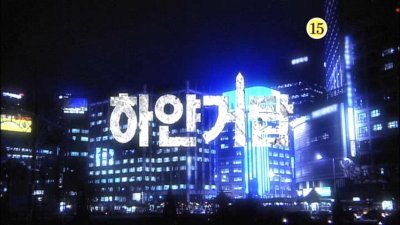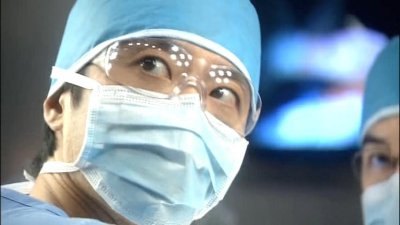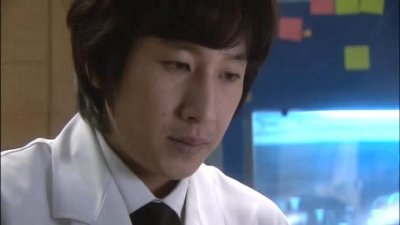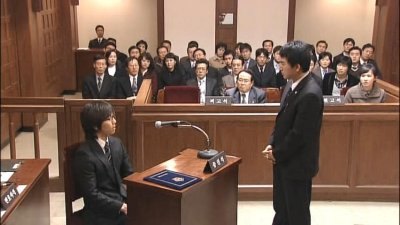| Reviews & Columns |
|
Reviews DVD TV on DVD Blu-ray 4K UHD International DVDs In Theaters Reviews by Studio Video Games Features Collector Series DVDs Easter Egg Database Interviews DVD Talk Radio Feature Articles Columns Anime Talk DVD Savant Horror DVDs The M.O.D. Squad Art House HD Talk Silent DVD
|
DVD Talk Forum |
|
|
| Resources |
|
DVD Price Search Customer Service #'s RCE Info Links |
|
Columns
|
|
|
Inside the White Tower (Korean TV Series)

Inside the White Tower is a South Korean television drama (K-drama) about the lucid politics surrounding the lives of two medical doctors -- which is based on the works of Yamazaki Toyoko. The series is a definite change of pace for the common K-drama, as it is not based on a love story. The majority of K-dramas follow a storyline with a love triangle or two, memory loss, villainous characters, mistaken identities, and other attributes that make a solid romance oriented soap opera. Instead, "White Tower" focuses purely on non-romantic drama.
Personally, I love the sordid love affairs and sappy romance commonly used in K-dramas, but at the same time I enjoyed the change of pace. The unfortunate part is that "White Tower" was not nearly as strong as I expected. It has strong points, but there are also too many generic elements to it. Still, "White Tower" is an enticing drama and will be enjoyed by K-drama fans.
The show's premise follows the development of two medical doctors who work at Myongin University Hospital. The two doctors are Jang Joon-Hyuk and Choi Do-Young and they are very different. While they are both brilliant in their professions, Dr. Jang aspires to become the best of the best and Dr. Choi only cares about saving people. In the specific case of Dr. Jang, he is the hospital's best and brightest surgeon. In fact, he is expected to become the next Chief of Surgery. Dr. Choi lacks the career ambition and is purely motivated to help patients. He works in pathology and is less noticeable when compared to Dr. Jang.
Inside the White Tower's storyline is divided into three primary parts. First, there is a major internal struggle of power for control of the next Chief of Surgery. While Dr. Jang is the clear successor, his predecessor Dr. Lee Ju-Wan fears the worst. The hospital doctors are not just medical doctors; they are also professors who are responsible for training the next generation.

Dr. Lee does not think Dr. Jang has the compassion to really care or understand the needs of the patient. (He is also offered a sweet job to get someone else selected.) So, he embarks on a campaign to find another replacement. His selection is another brilliant doctor, Roh Ming-Gook. The race between Drs. Jang and Roh for the position of Chief of Surgery is a pretty exciting aspect. The development includes a lot of twists and turns as bribes come into play and allegiances shift within the hospital ranks. This aspect of the show is played out fairly well and provides the juiciest drama.
Second, another plotline runs concurrently with the power struggle for the next Chief of Surgery. This plotline involves Dr. Choi. He works on a couple of cases that really show his compassion. The first is a young girl who is dying of cancer. It is a very somber development. The second is a patient who came in for minor stomach pains. Dr. Choi identifies that he has cancer and must be operated on. The test results also indicate the cancer could have spread to his lung. The patient is transferred into Dr. Jang's care, who does not share the same concern. Dr. Choi pisses off everyone trying to fix the situation. He puts his career aside to help the patient.
Midway into the series, the first two plotlines come to a close. Dr. Jang beats Dr. Roh and is voted the next Chief of Surgery by the hospital's senior staff. As he takes control of the surgery department, his compassion and tolerance for nagging patients drops to zero. It is at this point that Dr. Choi's cancer patient plotline really takes its toll. Since Dr. Jang took the patient into his care and removed the tumor from his stomach, his heath has only been on the decline. The assigned doctor failed to properly treat him and he dies. It turns out Dr. Choi was right and the cancer had spread to his lung. Dr. Jang, the presiding surgeon, is held responsible for the death. The family of the deceased sues him and the hospital.

The third major plotline turns into a rather generic courtroom drama. The fact of the matter is that it is just unappealing. The case itself is not what makes it hard to stomach, but simply how long it plays out. Furthermore, the developments in the case are really not that big or exciting. The family of the deceased struggles to find key witnesses to testify. No one in the hospital wants to go against their own. Dr. Choi struggles with his compassion and self-worth, but eventually does what is right. Regardless, the courtroom aspect just did not have the same entertainment value as long running court cases -- for example Murder One.
What works for Inside the White Tower are the initial main plotlines. The drama dealing with the power struggle for the next Chief of Surgery and Dr. Choi's cancer patients provide a good level of entertainment. In particular, the politics, corruption, and greed that come with the power struggle are especially enticing. The show's characters are also quite strong. On the flipside, the show does not fare well during the final major plotline. The extended "courtroom" drama lacks a strong appeal and feels like it should have been closed out in a matter of episodes, rather than over the course of several.
Overall, Inside the White Tower is a pretty strong drama. For lacking what K-dramas do best (soapy melodrama filled with love triangles, memory loss, villainous characters, etc.), "White Tower" offers solid character development and an interesting power struggle with corruption and greed. However, at the same time the drama attempts a legal battle that takes too long close out. In the end, Inside the White Tower is a good K-drama that is worth seeing, but it is not the genre at its best.

The DVD
Video:
This release is given in anamorphic 1.78:1 ratio widescreen color. The picture quality is excellent, providing a clear and clean picture with minor color distortions and compression artifacts. Both dark and bright colors are represented very well.
Audio:
The audio is given in Korean 2.0 stereo sound. The track is dialogue driven and has limited use of the surround/stereo capability. The music sounds good; it is dynamic and vibrant. For non-spoken language options, there are English subtitles.
Extras:
For extras, Inside the White Tower has over an hour of bonus content, which runs for 1:19:31. The content includes "Kim Myung Min Interview", "Main Cast Interviews", "Press Conference", "Interviews with Professional Advisors", "Writer Interview", "Director Interview", "Viewer Comments", and "Why is Inside the White Tower so special?". The bonus content makes for a decent watch, but really will not be very appealing unless you are a big fan of the show.
Final Thoughts:
Inside the White Tower is a K-drama that deviates from the genre's relatively common formula. For some, the deviation will be an attractor, as it opens new venues for drama. But for others, it won't be as appealing. The different approach offers a mixed bag, with a solid rendition of melodramatic office politics, enticing and compassionate character development, and a rather bland, generic courtroom fiasco that just took too long to unfold. In short, "White Tower" starts off with a great punch and goes strong. However, midway it hits a point when the drama has a difficult time being anything more than generic, uninteresting television.
|
| Popular Reviews |
| Sponsored Links |
|
|
| Sponsored Links |
|
|
| Release List | Reviews | Shop | Newsletter | Forum | DVD Giveaways | Blu-Ray | Advertise |
|
Copyright 2024 DVDTalk.com All Rights Reserved. Legal Info, Privacy Policy, Terms of Use,
Manage Preferences,
Your Privacy Choices | |||||||















